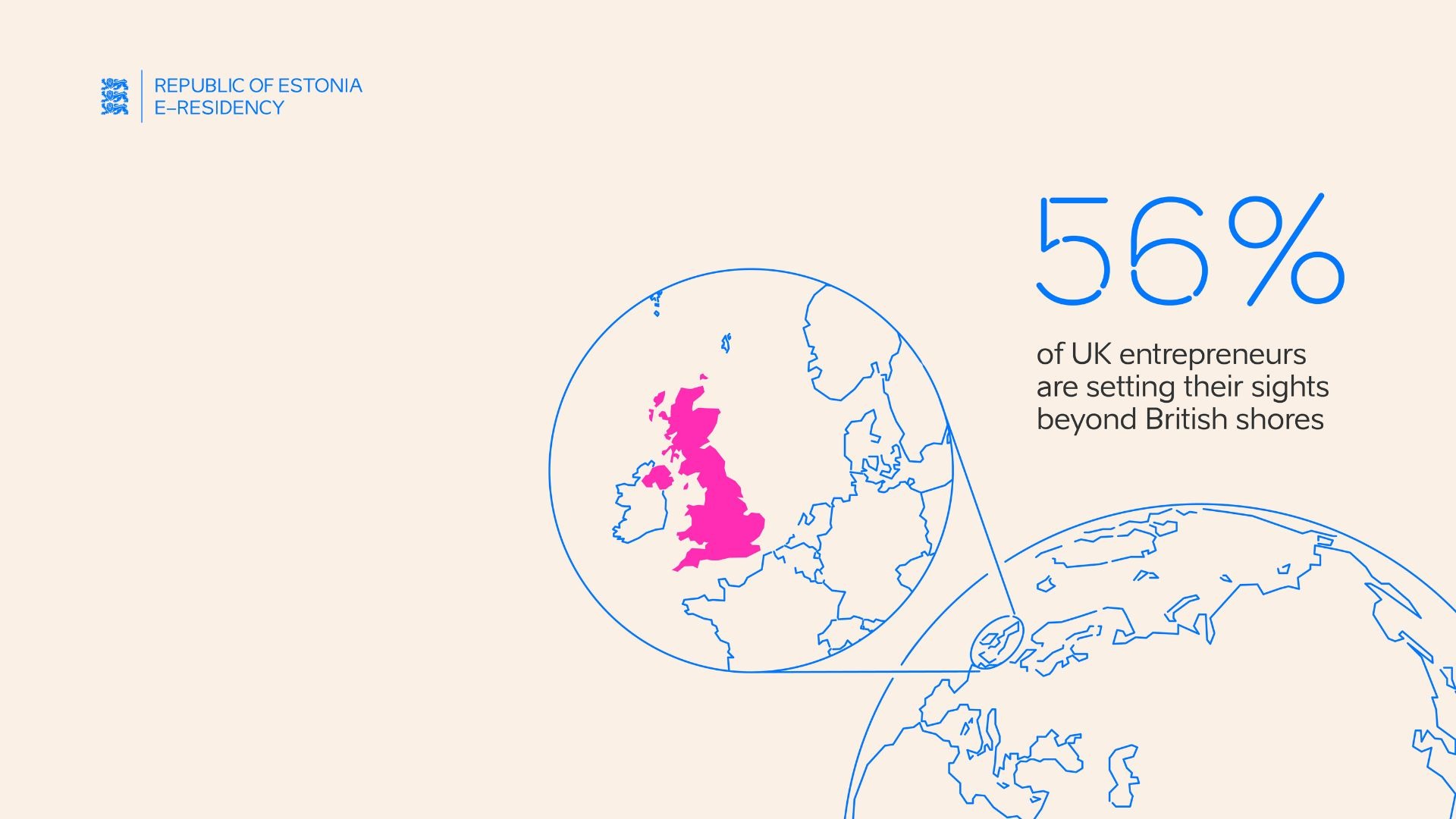UK entrepreneurs set their sights on international shores
E-Residency has launched a UK business hub based on new research revealing key drivers and hurdles in UK business growth strategies in 2024 and beyond

Over half of UK business owners and aspiring entrepreneurs (56%) are setting their sights beyond British shores, driven by the growth potential and enhanced flexibility offered in other global markets. This shift, uncovered by new research from Estonia’s e-Residency programme, signifies a pivot in UK entrepreneurship towards international markets, diversifying beyond local dynamics.
The survey of 1,000 UK business owners and aspiring entrepreneurs explores the rapidly changing entrepreneurial ecosystem. It underscores the need for new solutions to cut through bureaucratic red tape, highlighting advanced digital services and mobility as key drivers for success this year. Some of the highlights uncovered by the research include:
- 70% of Millennial and Gen Z UK entrepreneurs are eager to start businesses outside the UK
- Over half of UK entrepreneurs (52%) are using digital platforms to scale their operations
- 90% are already leveraging AI, blockchain and cloud computing to enhance operational efficiency
- Almost half (46%) are still grappling with the complexities of Brexit
Read more insights about AI, blockchain, digital identity, cross-border business, and business challenges below.
E-Residency launches UK Business Hub
In light of the research, and to help UK business owners seize opportunities in Europe, e-Residency has launched a new UK Business Hub on our website.

The goal is to support British entrepreneurs so that they can learn more about Estonia's pioneering digital business solution, see how it could benefit their goals of location independence and having a base in the EU, and introduce them to some amazing e-resident founders from our incredible business network. Founders like Chris Shirley, CEO of Haus of Hiatus, who enthuses about his experience as an e-resident:
"e-Residency has allowed me to run a business from anywhere in the world. I can literally be doing my accounting from one app."
Borderless business
As UK businesses navigate the complexities of a globalised economy, entrepreneurs are adjusting their strategies to tap into international markets and boost cross-border trade. This proactive shift is reflected in the attitudes and actions of UK business owners and aspiring entrepreneurs:
- Generational divide in global ambition: 70% of Millenial and Gen Z respondents are eager to set up shop abroad – more than double the rate of Baby Boomers (34%).
- The rise of digital nomadism: Nearly two-thirds (63%) of respondents are exploring or have adopted a digital nomad lifestyle, using the latest tech to manage business operations from anywhere.
- Building worldwide webs: Three in five respondents (60%) are engaging in global partnerships and collaborations to extend their reach and drive innovation through diverse insights.

AI takes centre stage, again
UK entrepreneurs are redefining their global strategies by elevating AI and emerging technologies from handy tools to transformative assets for business growth. This shift signals an increasing reliance on innovative digital solutions across the entrepreneurial landscape:
- Tech takeover: While it’s no surprise that tech-savvy entrepreneurs are leveraging the likes of blockchain, AI and cloud computing, what's striking is the scale of adoption – 90% of respondents are already leveraging these technologies to boost operational efficiency.
- Generational tech divide: 77% of Millenial and Gen Z respondents view these technologies as crucial or highly important to their operations, compared to only 27% of Baby Boomers.
- Digital drives growth: Over half of respondents (52%) are likely to scale up this year using digital platforms, highlighting a demand to embrace online tools as a pathway to expansion.
Next tech wave: Digital identity
Digital identity technologies are gaining traction in today’s business landscape as awareness of their potential to mitigate the rising threat of fraud increases. Yet, these tools are not just for secure identity verification. They also empower entrepreneurs to manage businesses online, perform transactions globally and handle everything from banking to tax filing, regardless of physical location.
Tallinn-based founder Vicky Brock, who set up her company Vistalworks in Estonia following Brexit, has experienced the ease of doing business administration digitally:
"I can get my taxes done in minutes. I just control it with my single ID card."
Despite their vast potential, awareness of these technologies is surprisingly low. This gap underscores a need for education and reveals an opportunity for those ready to embrace these solutions:
- Limited awareness: Just 1 in 5 respondents (20%) report being highly aware of digital identity technology, despite its potential to enhance security, trust and transparency for businesses.
- Enhancing operational efficiency: Nonetheless, when asked to pick its most important benefits, a third of respondents (33%) highlighted significant efficiency gains as a top advantage. By simplifying identity verification, these technologies can cut down administrative overheads.
- Security as a priority: Similarly, a third of respondents (33%) believe enhanced data security is a key benefit, underscoring the role of this tech in safeguarding business and customer data.
- Key to future expansion: A forward-looking 22% of respondents already consider these tools as essential for their global expansion plans within the next year. This more than doubles to 47% over a ten-year horizon, reflecting a growing consensus on their importance.
E-Residency Managing Director Liina Vahtras noted:
“Entrepreneurs across the globe are navigating a rapidly evolving landscape. To succeed in today's interconnected world, businesses must embrace new models of collaboration and competition, looking beyond local markets to seize global opportunities. By investing in innovative technologies and fostering a culture of adaptability, entrepreneurs can reach new heights, regardless of their location. These strategies are essential for both emerging and established businesses to thrive in a global economy.”
Current state of UK entrepreneurship
Individuals navigating the UK’s entrepreneurial ecosystem, built for compliance and accountability, recognise this landscape involves a blend of challenges and rewards. This understanding fosters a proactive community, eager to tackle obstacles and seize opportunities for big wins:
- Brexit transition: As the nation continues to adapt to the post-Brexit environment, almost half of respondents (46%) are still navigating through the complexities it brings.
- Securing new investments: Despite facing various challenges, 65% of Gen Z and Millennial respondents have expressed their eagerness to expand their business either domestically or internationally this year if they manage to secure new investments.
- Defying economic pressure: Additionally, 38% of all respondents are still gearing up for growth this year, despite the challenges of inflation and rising operational costs.
- Bureaucratic red tape: Taking a deep dive into the supportiveness of the UK business environment, 31% of respondents feel the impact of administrative processes, while nearly a quarter (24%) dedicate 11-20 hours weekly to regulatory adjustments alone.
- Government support: When asked to choose their top two priorities for support, financial incentives such as tax reliefs and grants came out on top; equally critical is the demand for streamlined business processes, from tax procedures to business setup.
Visit the UK Business Hub to read more and find out how e-Residency could be a good solution for you:
Research Methodology
The study was carried out by Censuswide with a participant group of 1,003 business owners and aspiring entrepreneurs, divided equally. All participants were aged 18 and older. Data collection occurred from March 25, 2024, to April 2, 2024. Censuswide adheres to the standards of the Market Research Society and follows both the MRS Code of Conduct and ESOMAR principles. Additionally, Censuswide is a member of the British Polling Council.
More from e-Residency
- Sign up for our newsletter
- Watch fresh video content - subscribe to our Youtube channel
- Meet our team and e-residents - register for our next Live Q&A
